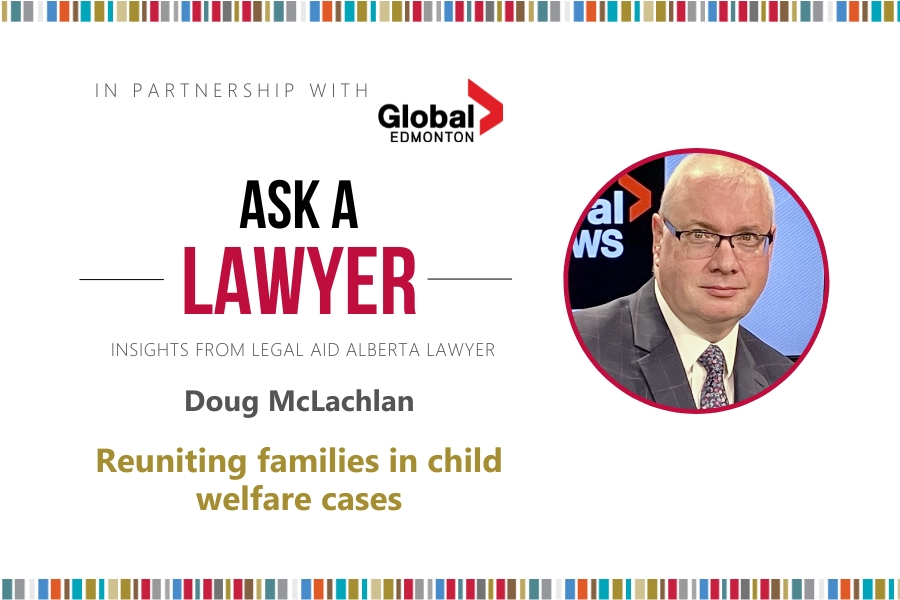Regardless of a family’s background, there can be times when circumstances in a home put a child’s well-being at risk. In those instances, the child can be removed from the home until the parents are better able to care for the child. That’s where Legal Aid Alberta lawyers like Doug McLachlan come in.
McLachlan appeared on the Aug. 5 Global Morning News Edmonton Ask A Lawyer segment to discuss child welfare and child welfare law.
Watch the segment (transcript below)
Erin Chalmers: It’s a difficult social issue that can affect anyone. There are times when families are dealing with challenging life circumstances so serious that the well-being of their children is at risk here today to talk about child welfare and child welfare law is Legal Aid Alberta Staff Lawyer, Doug Mclachlan. Good morning, Doug. Thank you so much for being here today.
Doug McLachlan: Thank you for having me.
Chalmers: So, First of all, let’s define the topic, when we say child welfare, in this context.
McLachlan: Well essentially, You’re dealing with situations where you want to keep children safe in their homes and with their families. And if Child and Family Services feels that there’s some protection concern that puts a child at risk, they may make a court application to protect that child and in some cases, even apprehend that child. And if that’s the case, you’re going to want to get a lawyer, because that’s a real imbalance between the power that the government has and a parent has. And Legal Aid Alberta lawyers, and others, will give you some good legal advice, which you’re going to need.
Chalmers: OK, so what are some of the common issues then, that someone would have a lawyer like you come in?
McLachlan: Well, everybody’s situation is unique. But in my 25 plus years of doing this, very commonly, you’ll deal with issues of domestic violence or domestic disharmony, substance abuse issues and addictions. In some cases, mental health issues that might put a child in danger.
Chalmers: And so you say you hire a lawyer. Or you go to talk to Legal Aid Alberta, you go to the first initial custody hearing. What happens after that?
McLachlan: Well, At an initial custody hearing, if a child has been apprehended and the government then puts forward their case to say, here are the protection concerns they’ve identified, and here’s why it’s so serious that we can’t have the child remain in the home, at least for the time being. And at that initial custody hearing, it happens very early in the process. So again, you’re going to want to get a lawyer. The parents will then say, ‘OK, well, things aren’t as serious as you may have thought. Or maybe they were at the time of the apprehension. But here’s what’s been addressed since.’ And the goal, of course, is to try to get those kids back home, right then and there. But sometimes you’re not successful, right?
Chalmers: And then is that a situation where they end up in foster care, or how, where? How does that work?
McLachlan: Yeah. The director (of Family and Child Services) then, if they have gotten initial custody, then the director will make a determination as to where the kids might stay. Foster care, sometimes they make arrangements with extended family.
Chalmers: I can imagine – I mean, even, just having this conversation, just having this conversation with you as a parent, that this is a very serious matter. As a lawyer representing these, this child or these parents, this must weigh a lot on you on how to present and the decisions. That can be made.
McLachlan: It’s a very challenging area of law, yes. It’s very emotional. I mean, they’re your kids. Of course your emotions are going to be engaged. It’s also incredibly rewarding. At least, it has been for me. You’re dealing with issues like addictions, or you’re dealing with issues of mental health. And to see parents make successes and get and gain skills so that they can become better parents, that’s very rewarding. There’s nothing quite as enjoyable for me as a lawyer as to have a parent say “Thank you for getting my baby home,” and whether they’re a 15-year-old or a newborn, they’re still going to be your babies.
Chalmers: And I guess, that’s the important thing is that these, this child welfare, these, these things need to be put in place to make sure, to protect children. But in the end, it can also help the parents realize the changes that they need to make.
McLachlan: It is. And in fact, that’s really often – the goal is to identify the protection concerns and then get to work to solving them. And if you’ve got qualified legal advice, you can come up with a plan that works best for you and your family.
Chalmers: And that’s the most important message today is: Reach out to Legal Aid Alberta. Get that advice before you start, even really begin that process.
McLachlan: Exactly. Yeah.
Chalmers: OK, thank you so much for coming on the show this morning to chat about this.
McLachlan: Thank you for having me. I very much appreciate it.
Chalmers: Legal Aid Alberta lawyers specialize in family law, child welfare, domestic violence, immigration, as well as youth and adult criminal defense. If you have any questions for a lawyer, you can send it to [email protected]


